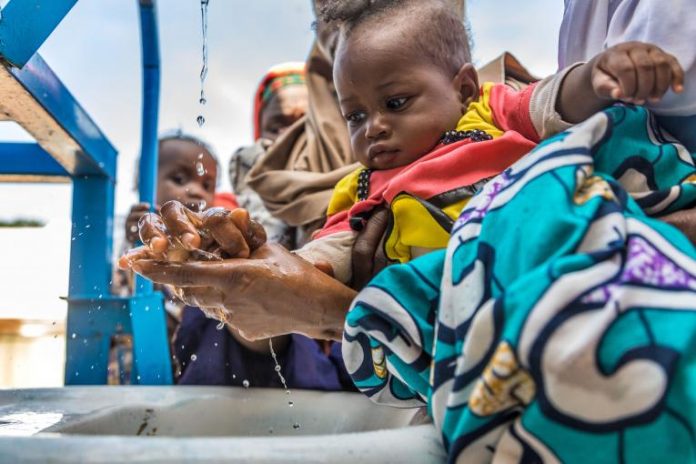… UNICEF Warns Of It’s Imminent Dangers
Despite the fact that soap-based handwashing is critical in the fight against infectious diseases such as COVID-19, only 16% of Nigerians have access to basic handwashing facilities at home, placing families and communities at risk of numerous infectious diseases, particularly children.
Approximately one out of every ten people – or 2.3 billion people – do not have access to handwashing facilities at home, including water and soap.
On Global Handwashing Day, UNICEF warned that the situation is particularly dire in the least developed countries, where nearly six out of ten people lack access to basic hand hygiene.
UNICEF WASH Director Kelly Ann Naylor hinted that , “Global response efforts to the COVID-19 pandemic have created an unprecedented time for hand hygiene. Yet progress remains far too slow for the most vulnerable, underserved communities.
“Hand hygiene cannot be viewed as a temporary provision to manage COVID-19. Further long-term investment in water, sanitation and hygiene can help prevent the next health crisis from coming. It also means fewer people falling ill with respiratory infections, fewer children dying from diarrheal diseases, and more pregnant mothers and newborns protected from preventable conditions like sepsis.”
The latest data show that some progress has been achieved since 2015. For example, the global population with access to basic hand hygiene at home has increased from 5 billion to 5.5 billion, or from 67 per cent to 71 per cent. However, if current trends persist, 1.9 billion people will still not have access to basic hand hygiene by the end of the decade.
In Nigeria, 21 per cent of Nigerians had access to basic handwashing facilities at home in 2018, compared to 16 per cent in 2019, indicating a worrying downward trend.
While adding that, according to the latest estimates: Globally, 3 in 10 people – or 2.3 billion – do not have access to basic handwashing facilities with water and soap at home, including 670 million people without any facility at all. In the least developed countries, more than 6 in 10 people lack basic hand hygiene facilities at home.
4 in 10 schools worldwide do not have basic hygiene services with water and soap, affecting 818 million students, of which 462 million attend schools with no facility at all. In Nigeria, 9 out of 10 schools have no place for children to wash their hands.
1 in 3 healthcare facilities worldwide does not have hand hygiene facilities at points of care where the patient, healthcare worker, and treatment involve contact with the patient. In Nigeria, this figure is 4 in 5 healthcare facilities
“The downward trend in access to hand hygiene services in Nigeria is very worrying,” said Rushnan Murtaza, Deputy Representative, UNICEF Nigeria.
“Handwashing with soap and water may seem like a simple act – but it is lifesaving. It protects us from many diseases, including cholera. We must work together to make handwashing not only possible, but a habit. This will have a hugely positive impact for the health and well-being of all Nigerians.”
UNICEF , however, urged governments to commit to providing hand hygiene, not as a temporary response to the pandemic, but as an investment in public health and economic resilience. The latest joint UNICEF and WHO report identifies five accelerators that can enable governments to rapidly scale up access to hand hygiene, including good governance, smart public finance, capacity building, consistent data, and innovation.

